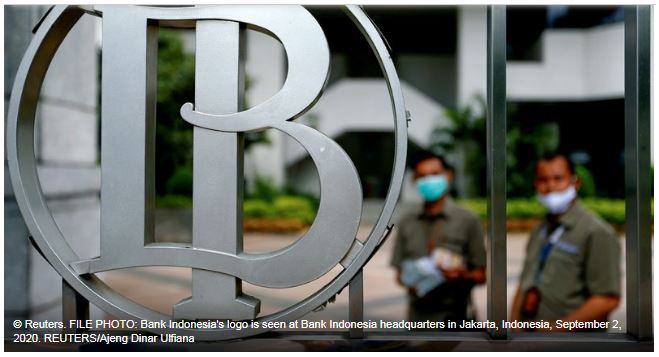Bank Indonesia to deliver third straight 50 bps hike on Nov. 17- Reuters poll
BENGALURU (Reuters) – Bank Indonesia will deliver a third consecutive 50 basis point interest rate rise on Thursday, according to a strong majority of economists polled by Reuters, although some expected a smaller quarter-point move given the relatively strong currency.
Despite easing slightly in October to 5.71%, inflation has stayed above the central bank’s target range of 2%-4% for five months and is likely to remain elevated following the government’s move to raise subsidised fuel prices in September.
In the meantime, Indonesia’s economy is performing reasonably well. Gross domestic product (GDP) expanded at its fastest pace in more than a year last quarter.
About 70% of respondents, 21 of 30, in the Nov. 7-14 poll expected the central bank to hike its benchmark seven-day reverse repurchase rate one half-point to 5.25% at its Nov. 17 meeting. The rest forecast a 25 basis point rise.
“A comfortable growth backdrop provides the central bank the necessary room to focus on inflationary expectations and keep currency underperformance in check through further rate hikes,” wrote Radhika Rao, senior economist at DBS Bank.
“In this spirit, a frontloaded 50 bp rate hike is likely on the cards, with a small probability that policymakers might lean towards an incremental increase if the recent pullback in U.S. inflation is viewed as a reason for the Fed to dial down its pace of hikes.”
Bank Indonesia has already raised interest rates by 125 basis points this year and a slim majority, 12 of 21, forecast a further 25 basis point rise in December with the median putting it at 5.50%. Three of 21 expected another half-point rise and six said no move.
So far this year, the rupiah currency is down around 9% against a strong U.S. dollar. But like the economy, it is performing better than many of its Asian peers.
Indonesia’s trade surplus beat forecasts at $4.99 billion in September on an export boom related to high commodity prices.
However, higher inflation is making imports more expensive, while global recession risks and slower growth in China will likely slow Southeast Asia’s largest economy too.
“The room for producers to increase output prices is still wide-open,” noted Irman Faiz, an economist at Bank Danamon, who expects inflation to peak at 7.3% in Q1 2023 and then drift down to 5.7% by year-end.
Faiz says that “current inflation pressure is supply-driven and stickier.”
While hiking interest rates by 50 bps for the second time last month, Governor Perry Warjiyo reiterated the move was to act ‘pre-emptively’ to curb lofty inflation expectations and to support the rupiah.
Median forecasts showed rates rising to 5.75% in the second quarter but then steadily falling back to 4.75% by the end of 2024, but forecasts for Q4 2023 were split. One-third of respondents, six of 18, said rates would end next year at 5.50%, eight said it would be higher than that and four said it would be lower.


 Thailand
Thailand




